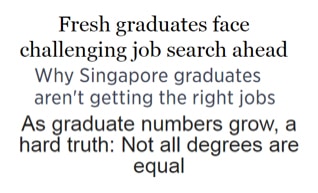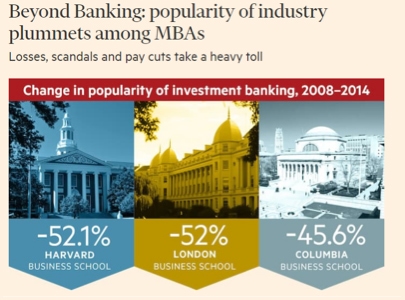Ramblings on The Sunset Industry, Bankers and Knowledge Workers
A quick chat with some young bankers, on the other side of 20, who were fresh management trainees not too long ago, reminded me of the old eager beaver days, waiting for my turn to be given a shot at success—defined then, as the first million dollars in the kitty.
And I recall some people who did quit at that first million, to go onto things different, some older colleagues who took a while and others earlier, if we cheat and count folks like the lucky trainee who struck the lottery after being rejected for a trading role, sparing a sad thought for those who miss out, like my unbeaten track record of never ceasing to fail to please Lady Luck in that respect.
The Sunset Industry?
What is different between then and now is that the zeitgeist has changed since the global financial crisis and the banking industry is no longer seen as the glorified career path that awaits the MBAs the end of the rainbow, along with a life of excesses. And vilification has come down hard indeed as the banking career popularity plummeted sharply, particularly investment banking which has long been beheld as the “master race” as Michael Lewis described in Liar’s Poker.
Excesses have all been curtailed with job security reduced to a non-existence with job cuts mounting as the industry continues to consolidate 8 years after the crisis. It has hit the shores of Singapore and Asia in recent months, as global banks withdraw yet it is a global perception, no doubt, as half Americans believe that there is less job security in the next 20 years.
I cannot blame those young bankers for their dour outlook and would not trade places with them for the elixir of youth and the opportunity for a second chance at life. For my dear friend, who is still a bank trader, her decision after her Masters was between trying out for that Emirates stewardess job (she would fail SIA) or the windfall of a 8 month paid management “training” (read as holiday) programme in London although she sometimes still wonders about Emirates. No chance the batch of bankers got a whiff of that sort “training” in their times.
Yet I would disagree with the lazy consensus is that banking is a sunset industry, tending to go with the existential crisis facing the banking industry (that we wrote about several months back in Living and Banking in Fear) which does not deem the end of banking because banks will not go away more than the fatty drippings of banking will not be as rich for the employees again.
These days, M&S biscuits are replaced by Khong Guan and business class travel is replaced by video conferencing, shareholders rejoice because mooncakes are unapproved expenses to gives the show of austerity even as client margins are little changed and bankers better continue to their jobs because there is a glut of CVs floating on street for their replacements.
Would that put anyone in a cheery mood if they were working with reasonable career expectations as opposed to some people I know who work for other reasons found on the higher rungs of Maslow’s hierarchy of needs?
Experiences at Work
As we read about Layoffs in Singapore up in Q2, unemployment among degree holders highest since 2009, in particular, among those aged 50 and above for the 5th consecutive quarter, I have a chance to think about the different people I have had the privilege of working with on the trading floor in the past, bless those departed ones.
To succeed on the trading desk, it is all about having someone to help you along in the early years and I was fortunate to have received some unbelievable mentorship in the past from people who were comfortable to impart, sadly very few of them were Singaporeans. Just having someone around to ask what is the Lombard?*#!! Rate is more helpful than you can imagine when lost in all the jargon. A friend would boast that it is a form of enlightenment after success achievement of one’s goals, where there is the belief that man make-th the method work and not the method make-th the man and the better man would succeed. Alas, too many of them have retired.
Then we have those who view your entry as a threat to their careers which is the mainstay these days. The openly hostile ones are perhaps less dangerous than the “frenemies”. Some could even be threatened because they are afraid their ignorance would be exposed. The others just afraid they would one day be displaced, both ruled by fear.
Knowledge Workers
Banking is a knowledge industry, most aspects of banking, that is, and especially trading and analysis work.
Everywhere we read about the shortage of knowledge workers but what and who exactly are they?
Peter Drucker has been credited with coining the term, defining them as “high level employees who apply theoretical and analytical knowledge, acquired through formal education, to develop new products or services”.
Examples include scientists, educators, engineers, financial analysts, doctors, lawyers and information system designers. Singapore acknowledges that in her SG51, choosing to pursue the vision for a SMART NATION and the need to sacrifice a little productivity for the knowledge based economy as written by Asst Professor Kenneth Goh who argues that Singapore Needs to Slow Down To Go Fast.
“For knowledge workers, transition periods—times for rest, recuperation, introspection, fostering relationships and developing personal interests—contribute to, rather than detract from, productivity.
Maintaining the routines, work practices and assumptions of a manufacturing economy are detrimental to the quality of knowledge work, and damage Singapore’s transformation into more of a knowledge economy. Exposing children to this frantic pace can also stymie Singapore’s transformation into a knowledge economy.”
Yet it is pointless when the new batch of bankers are not given the necessary mentoring to ensure they would be efficient workers as they mature, based on my passing observation and my conversation with the bunch of disillusioned young bankers who are disincentivised monetarily (possibly from pampered childhoods) and intellectually unmotivated as well from lack of direction except to perform their sales routine to mark-up prices on their clients, wistfully admiring their friends who picked more colourful careers in social media, so much for job security.
Youth Unemployment Will Be A Problem
In case we may not know, there is a whole generation of young workers lost (in unemployment) other parts of the world with considerable literature and studies devoted to the topic and its possible correlation with the rise of populism besides the long term impact on society and the economy.
While it is too early to say that Singapore could be on the brink of such a crisis, fulfilling jobs are harder to find these days, going by the responses of my younger friends, who are comfortable staying at home without paying rent which suggests that Singapore’s problem could be slightly different in “voluntary unemployment”?

How are we going to get to Smart Nation status at this rate?
My Idea: To Bring The Parents To the Workplace
How can employers best utilise older workers’ talents and take advantage of increasingly age-diverse workforces? Older workers are an abundant, valuable, and largely unrecognised resource. But negative stereotypes lead many employers to overlook this resource’s unique ability to increase productivity.
If Singaporeans are mostly unwilling to pay for professional mentoring or any form of self-improvement cum education without the guarantee of a recognisable certificate or the promise of a “get rich” formula, then perhaps the older employee who is likely to have higher job satisfaction, more realistic, experienced, emotionally stable and probably more willing to share?
And perhaps we can all ride out into the sunset with some happy smiles?



